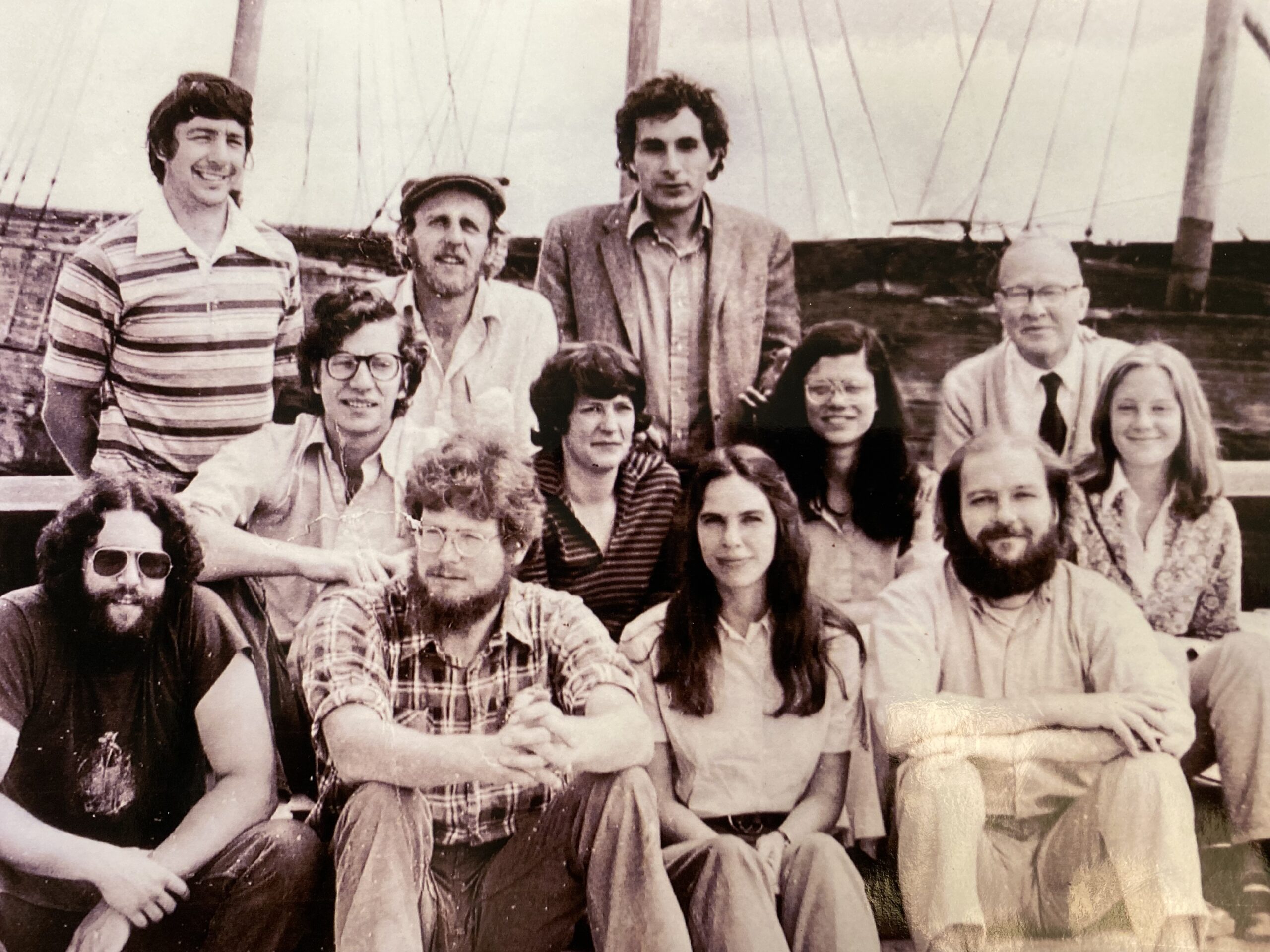
Our Story
CEI MISSION STATEMENT • 2023
To build a just, vibrant and climate-resilient future for people and communities in Maine and rural regions by integrating finance, business expertise and policy solutions in ways that make the economy work more equitably.
OUR HISTORY
From Civil Rights to Sustainable Solutions
Coastal Enterprises, Inc. (CEI) was founded in 1977 by Ron Phillips, a civil rights activist and recent seminary graduate, to help create income, employment and ownership opportunities, especially for people left out of the economic mainstream.
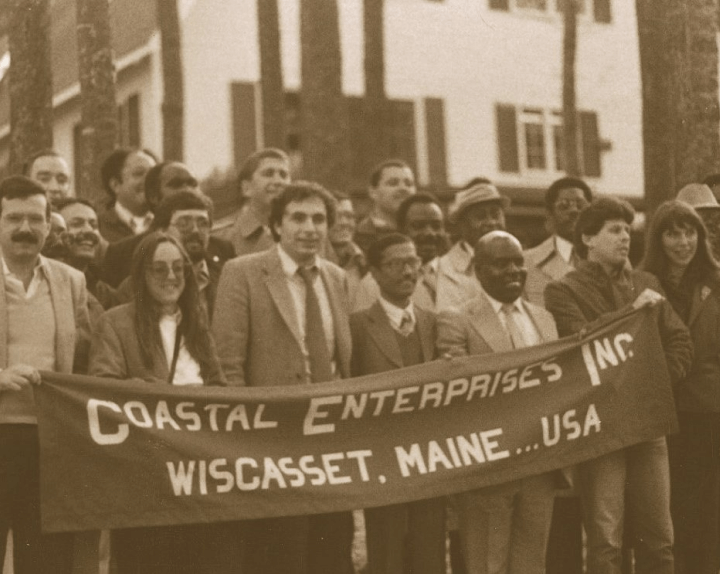
The impetus for CEI came from a few people who had the imagination to establish a community development corporation (CDC) in Maine.
The federal Office of Equal Opportunity launched CDCs in the late ’60s and early ’70s during the “War on Poverty” with the first CDCs founded primarily in urban areas with goals of revitalizing a low- or moderate-income community or neighborhood.
Then a CDC in Vermont showed that the model might have promise for larger, more rural geographies as well. At the time, Maine had little infrastructure to grow the state economy and the fishing industry, in particular, could benefit from a CDC’s focus.
CEI was incorporated in Bath, Maine…
with no balance sheet and a goal of supporting community-based economic development in the midcoast Maine region stretching from Freeport to Camden – a start-up with a big need for investment capital to meet big goals.
Initial funding to launch CEI came from local regional Community Action Agencies and small grants cobbled together from varied sources. Local county commissioners’ offices helped CEI employees build the capacity of the organization. Though the idea of a public-private partnership is familiar today, the model was still new then.
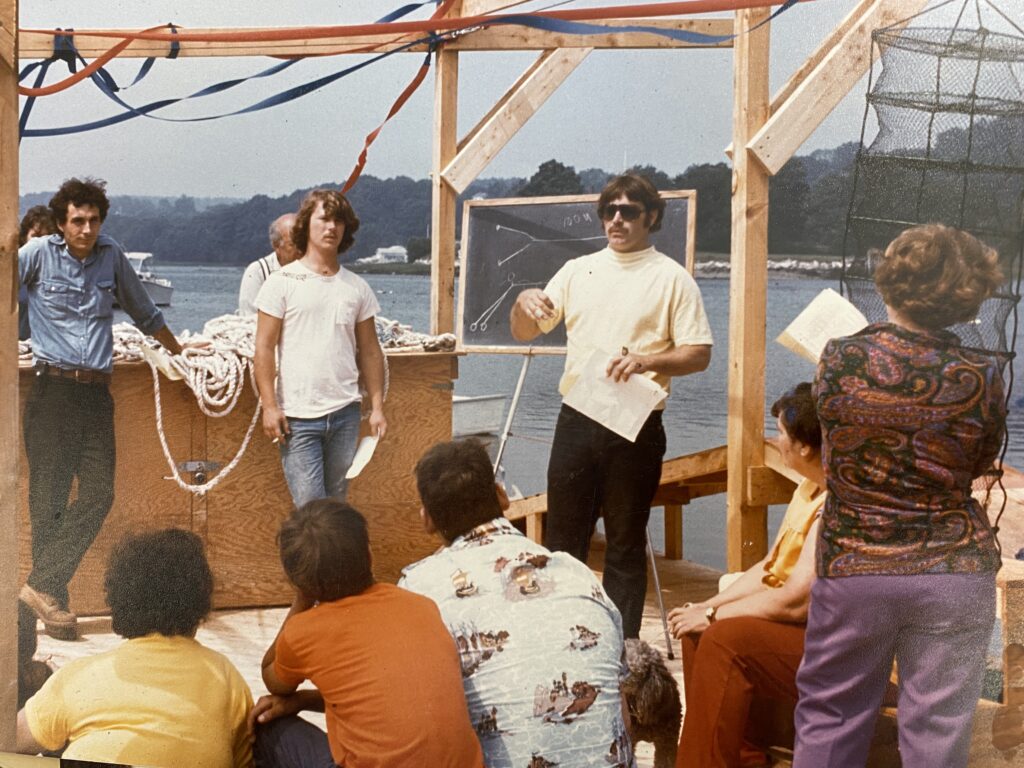
STARTING BY THE SEA – A SECTORAL APPROACH
In 1978, CEI made its first investment in the Boothbay Region Fish and Cold Storage, Inc., which had been recently destroyed by a fire.
This was a flagship project for CEI for many reasons. Saving the facility was a community initiative, an effort to preserve the town’s working waterfront and fishing heritage in the face of deepening development pressure from tourism-related business. CEI worked with local residents and community leaders on the project and secured financing that allowed the group to rebuild, modernize and expand the facility after a devastating fire.
The Boothbay project was a model for future CEI activity, demonstrating our capacity to respond to a community need and foreshadowing our commitment to sectorial development strategies, a multi-faceted approach that includes investing in capacity, market opportunities, infrastructure and policy development.
CEI MISSION STATEMENT • 1985
Coastal Enterprises, Inc. directs financial resources to promote economic growth in Maine, to foster growth of natural resource industries, and to support select job-generating small businesses.
Some early sector-based initiatives have included:
1977
Aquaculture Development Workshop, Maine Small Farms Project, and forestry woodlot management initiatives
1988
The Child Care Development Project
1993
Maine Fisheries Industry Project
…Today
we continue to work deeply within the fishing/aquaculture, agriculture/ food systems and child care industries with targeted programming, support and financing.
ADVOCACY & POLICY
In the early 1990s, CEI was part of a coalition that promoted the development of a federal funding program for community economic development. In 1994, the Community Development Financial Institutions (CDFI) Fund was established as part of the U. S. Treasury to provide a key source of capital to CDCs offering financial services to low-income rural and urban communities.
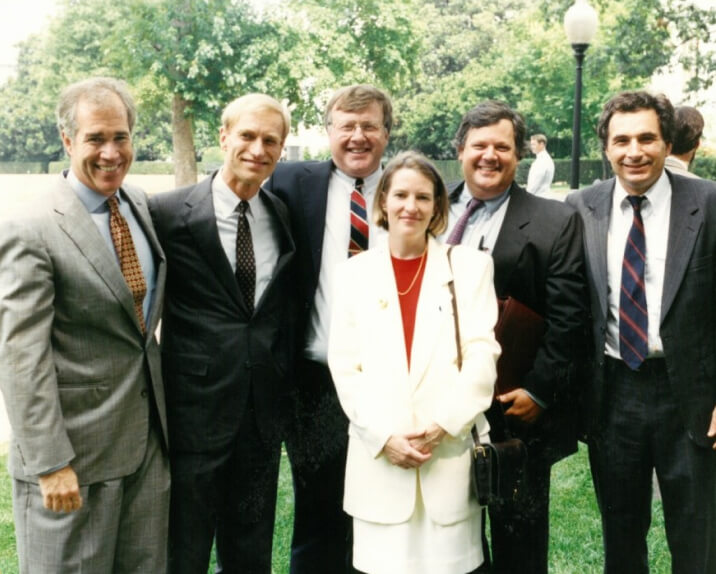
CEI MISSION STATEMENT • 1987
Coastal Enterprises, Inc. directs financial resources and technical resources to promote economic growth in Maine. Its central strategy has focused on development of natural resource industries, select job-generating small businesses, and targeting of benefits to low-income people. In 1987, CEI expanded its criteria to include limited-resource women in business and services that address a societal need, e.g. child care.
MEETING THE NEEDS OF DIVERSE ENTREPRENEURS
Through our partnership with Maine Small Business Development Centers, we host business counselors who provide no cost, one-on-one assistance to potential and existing business owners throughout the state, supporting entrepreneurs in Maine’s cities and it’s most rural regions.
Recognizing that the potential of female entrepreneurs was being under-served, CEI opened Maine’s first Women’s Business Center in 1995. Supported by the US Small Business Administration, CEI’s two Women’s Business Centers now serve Northeast and Southwest Maine through workshops, training, networking and one-on-one business counseling.
Then seeing a growing influx of refugees and immigrants to Maine in the mid-1990s, CEI responded by designing programs to serve Maine’s newest residents. StartSmart, a microenterprise program that provides linguistically and culturally sensitive business training to refugees and immigrants, has helped entrepreneurs from over 92 countries of origin and a rich variety of backgrounds to bring new products and services to their communities.
Recognizing the unmet need in the local indigenous community, CEI staff members helped the Wabanaki tribes in Maine launch Four Directions Development Corporation in 2001, the first Native-led CDFI in Northern New England.
CEI MISSION STATEMENT • 1990
Coastal Enterprises, Inc. directs economic and human resources to help Maine people with low incomes reach an adequate and equitable standard of living, working and learning.

CEI SUBSIDIARIES
While CEI’s primary market remains in Maine, with the birth of subsidiaries CEI Ventures Inc (CVI) in 1994 and CEI Capital Management LLC (CCML) in 2004, we expanded the overall organization’s reach to northern New England and then to rural regions nationally that build on our sectoral experience in areas like food processing and forest products, as well as our expertise on the unique needs of rural communities.
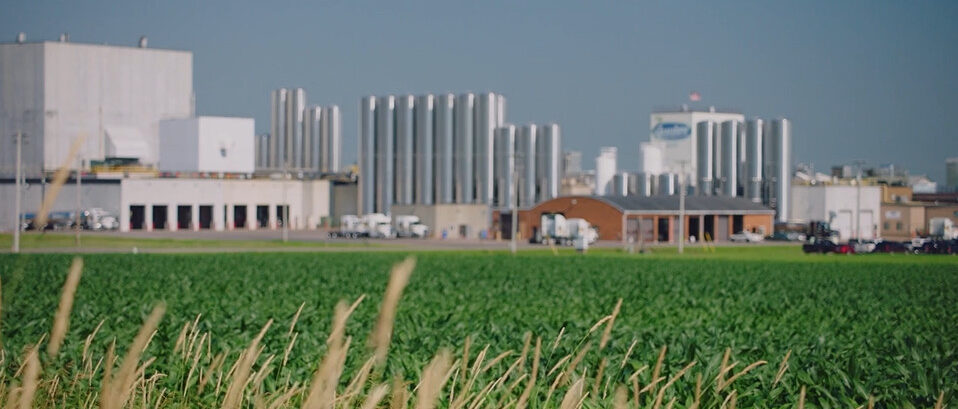
CEI MISSION STATEMENT • 2002
To help people and communities, particularly those with low incomes, reach an adequate and equitable standard of living, working and learning, in harmony with the natural environment.
1994
CEI Ventures, Inc.
2004
CEI Capital Management
2010
30 Federal Street Investments
2018
Bright Community Capital
2019
CEI-Boulos Capital Management
Expanding Access to Capital and Rural Reach
These independently-governed subsidiaries allow the organization to utilize different types of capital (venture capital and tax-credit incentivized financing) that are typically less accessible in rural areas
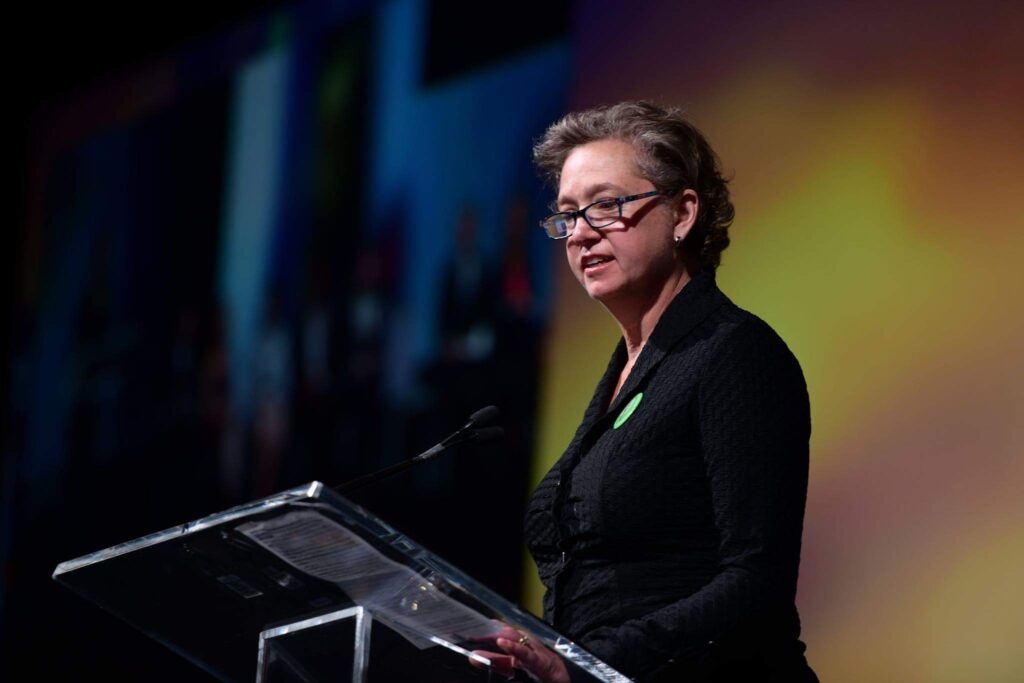
A NEW GENERATION OF LEADERSHIP
In 2016, Betsy Biemann, CEO, and Keith Bisson, President, took over the leadership of CEI upon Ron Phillips’ retirement, as the organization settled into its new headquarters in Brunswick, a LEED Platinum-Certified building created in line with CEI’s commitment to serve people and planet.
Staff conducted listening tours of hard hit industries and areas and developed key initiatives to respond to the most pressing needs of workers – good jobs that paid a living wage, basic benefits and offered opportunities for advancement, as well as access to quality child care. This work gave us a head-start as the pressure on frontline, low-wage positions and our child care system would soon increase unexpectedly and dramatically.
CEI MISSION & VISION STATEMENT • 2018
We envision a world in which communities are economically and environmentally healthy, enabling all people, especially those with low incomes, to reach their full potential.
ECONOMIC FIRST RESPONDERS
The COVID-19 Pandemic
In March 2020, CEI staff took their laptops home, assuming they would be returning in two weeks after Maine had “flattened the curve.” It quickly became apparent that the impact from COVID-19 would be neither brief nor small, particularly on the small businesses forced to close their doors or dramatically shift operations to meet changing health guidelines.
From makeshift offices in homes across the state, CEI staff reached out to clients and borrowers, helping them pivot operations, make sense of federal/state guidelines and apply to support programs for their businesses and employees.
In the first two months of the pandemic, CEI business advisors held over 2,000 individual coaching sessions with small-business owners—almost double the number they provide in a typical year. CEI’s lending team worked closely with borrowers, making modifications to over 50 percent of the loans in our portfolio.

Our operational capabilities and deep understanding of the business communities we served led to CEI being tapped by the State of Maine to administer several direct relief programs, including:
2020
$19.5 million to 533 farmers and food producers in December
2022
$20 million for the Agricultural Infrastructure Investment Program
22-23
$15 million for Child Care Infrastructure Grants
In addition
to providing pandemic-specific support, CEI continued to offer its regular lending and advising service and expanded them to include a third Women’s Business Center focusing on serving LGBTQ+ and BIPOC female entrepreneurs.
As the pandemic continued, it highlighted existing inequalities in our economic systems, particularly on lines of class and race.
Staff conducted listening tours of hard hit industries and areas and developed key initiatives to respond to the most pressing needs of workers – good jobs that paid a living wage, basic benefits and offered opportunities for advancement, as well as access to quality child care. This work gave us a head-start as the pressure on frontline, low-wage positions and our child care system would soon increase unexpectedly and dramatically.
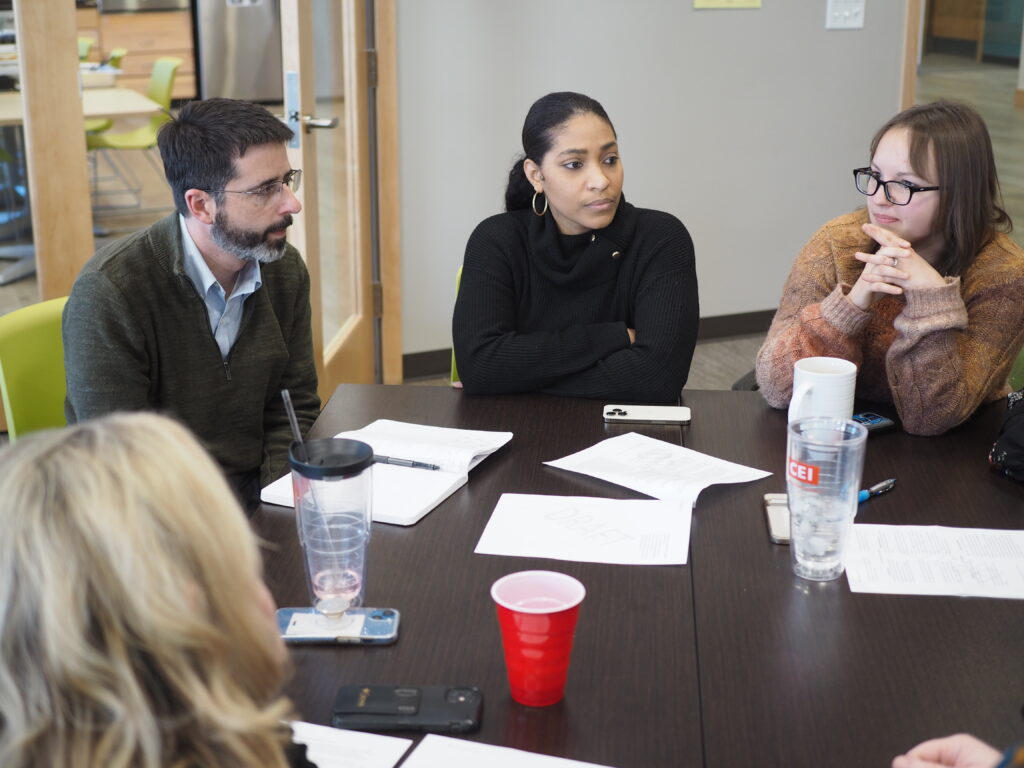
Learn More About CEI
- “Mission Far From Over” as CEI Marks 40th Anniversary
- Ron Phillips – Reflections on CEI’s 40th Anniversary
- CEI History: 25th Anniversary Report
- History of CEI: A Rural Community Development Corporation
- Profile of CEI: Winner of New Hampshire University’s Excellence in Economic Development Award 2007